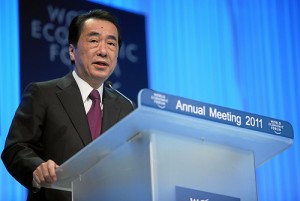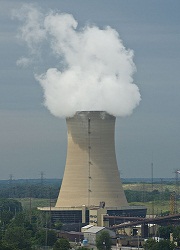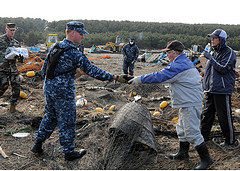Posted on 15 April 2011. Tags: blackouts, chernobyl, disastrous earthquake, divine punishment, fukushima, gubernatorial elections, ishihara, march 11, naoto kan, ruling party
 The ruling party of Prime Minister Naoto Kan suffered losses from the local elections held over their weekend after the nuclear power plant crisis further weakened his governance.
The ruling party of Prime Minister Naoto Kan suffered losses from the local elections held over their weekend after the nuclear power plant crisis further weakened his governance.
Shintaro Ishihara still won his fourth term regardless of what he said; that the disastrous earthquake and tsunami was a divine punishment for the country.
Ishihara is popular for his criticisms about China, including the elite bureaucrats at home. He urged residents in Tokyo to conserve energy after the problems of the quake-hit nuclear power plant caused power shortages and blackouts in the capital city.
Moreover, Kan was already pressured to step down even before the earthquake and tsunami occurred on March 11. The incident left his government coping up with the worst crisis that hit Japan since World War II.
Yet, Prime Minister Kan is unlikely to be forced out of Japan while the country is still regaining control over the crippled Fukushima power plant located north of Tokyo. Today, it is the biggest nuclear crisis in the world since the tragic Chernobyl occurred.
Kan’s ruling Democratic Party lost 69 seats during the votes cast on Sunday for the prefectural assemblies. The party also lost three gubernatorial elections.
Still, Democratic Party takes over the parliament’s lower house. However, it needs the opposition, as well as the funding legislation in the upper house to assist them in passing the bills.
Analysts has previously expected the Democratic Party to have a heavy loss in the elections, which was likely to be blamed on Kan.
Posted in Nation and World
Posted on 27 March 2011. Tags: consumptions, electricity usage, fukushima, growing concern, last option, nuclear power plant, nuclear weapons, princeton university, professor frank, tsunami in japan
 After what happened to the Fukushima Daiichi nuclear power plant in Japan following the tsunami that hit their country March 11, more and more Americans are concerned about nuclear plants near them. The biggest question in their minds – is it safe? Do we really need it?
After what happened to the Fukushima Daiichi nuclear power plant in Japan following the tsunami that hit their country March 11, more and more Americans are concerned about nuclear plants near them. The biggest question in their minds – is it safe? Do we really need it?
The need for nuclear power depends mainly on the available natural resources of a country. At present, the United States has 104 commercial nuclear reactors and they supply 20% of our electricity needs as confirmed by the United States Energy Information Administration. That percentage is lower than Japan’s dependence to nuclear energy which supplies for 27% of their nuclear energy needs.
Experts said that Japan will have a hard time shutting down its nuclear plants because they do not have natural resources to compensate for the possible electricity loss. Moreover, fuel cost of nuclear energy is low.
Aside from the possible risks should another natural calamity strike such as the Tsunami in Japan, one other growing concern about nuclear energy is its tendency to be used for nuclear weapons. That is the reason why Professor Frank von Hippel of Princeton University said that nuclear power should only be used as a last option.
He further said that instead of looking for more ways to generate energy, we should focus on energy efficiency instead. We should look for ways to reduce electricity usage so that whatever natural energy source we have, it will be enough for our day to day electrical consumptions.
Posted in Featured News, Nation and World
Posted on 27 March 2011. Tags: chiba, fukushima, nuclear agency, nuclear plant, number 3, radiation levels, sun damage, tokyo electric power company, uranium fuel, water samples
 The radiation levels in the air outside the Fukushima Daiichi nuclear plant continue to fall. The world nuclear agency said on its website that radiation levels continue to decrease. However, people are still concerned as radiation levels remain high in waters in two different locations.
The radiation levels in the air outside the Fukushima Daiichi nuclear plant continue to fall. The world nuclear agency said on its website that radiation levels continue to decrease. However, people are still concerned as radiation levels remain high in waters in two different locations.
A representative of the company operating the nuclear plant – Tokyo Electric Power Company – said that water samples from reactors 1 and 2 showed high levels of radiation. What is even more disturbing is that radiation levels from water samples of reactor 3 are twice as high. Some analysts say that the radiation levels in reactor number 3 suggest a possible leakage from the reactor’s core.
Work around reactor number 3 has been stopped after some men have accidentally stepped on contaminated water. Those men were exposed to around 175 millisieverts of radiation. Just to give you an idea of how high this is, people who work in highly industrialized areas generally receive 3 millisieverts of radiation every year. After having been admitted for four days in a hospital in Chiba, the men simply had injuries that can be akin to really bad sun damage.
Experts have over and over said that reactor number 3 is their main concern because among all reactors, it is the only one that has used uranium and plutonium fuel which is more dangerous than pure uranium fuel.
Nishiyama accepted that they had a difficult time controlling the pressure and temperature within the reactors. However, they have declared reactor number 1 to be stable Friday.
Posted in Nation and World
 The ruling party of Prime Minister Naoto Kan suffered losses from the local elections held over their weekend after the nuclear power plant crisis further weakened his governance.
The ruling party of Prime Minister Naoto Kan suffered losses from the local elections held over their weekend after the nuclear power plant crisis further weakened his governance.
 After what happened to the Fukushima Daiichi nuclear power plant in Japan following the tsunami that hit their country March 11, more and more Americans are concerned about nuclear plants near them. The biggest question in their minds – is it safe? Do we really need it?
After what happened to the Fukushima Daiichi nuclear power plant in Japan following the tsunami that hit their country March 11, more and more Americans are concerned about nuclear plants near them. The biggest question in their minds – is it safe? Do we really need it? The radiation levels in the air outside the Fukushima Daiichi nuclear plant continue to fall. The world nuclear agency said on its website that radiation levels continue to decrease. However, people are still concerned as radiation levels remain high in waters in two different locations.
The radiation levels in the air outside the Fukushima Daiichi nuclear plant continue to fall. The world nuclear agency said on its website that radiation levels continue to decrease. However, people are still concerned as radiation levels remain high in waters in two different locations.